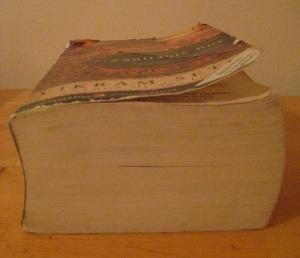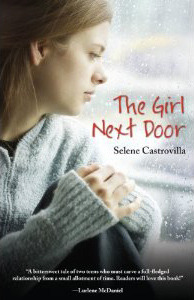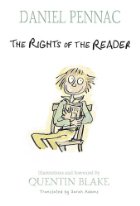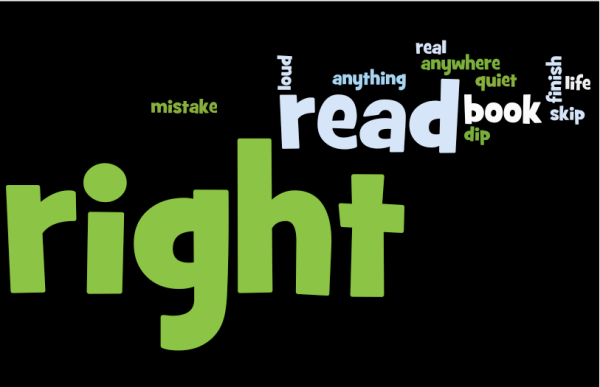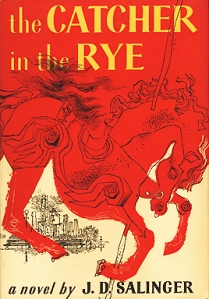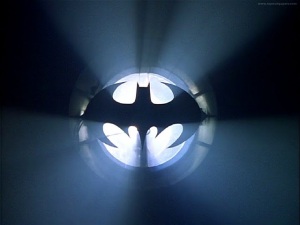A Friendly Reminder
To anyone still awaiting new content on this site: I’ve headed over to my new home, www.erinreads.com! You can click on the site name to be taken there, or you can use the subscription links to the right on either site to update your subscription. I hope you’ll join me over on the new Erin Reads!
The Surprise Unveiled: Erin Reads Has Moved!
I posted yesterday about a top secret project on which I’ve been hard at work. Well, today is the day that surprise is unveiled:
Erin Reads has moved!
Yes, Erin Reads now has a new home! I’ve been working on a self-hosted site for a while and am proud to unveil it. The new site is:
http://www.erinreads.com
Please update your subscriptions! To make it extra easy for you to do:
CLICK HERE to subscribe to the new RSS!
To celebrate the move, I’m currently hosting a giveaway for a book of your choice, up to $15, from The Book Depository. Please join me over on the new Erin Reads for details!
Sunday Salon: A Giant Book and a Secret Project
This Sunday, I have two fun things to tell you about: a giant book and a secret project.
The Giant Book
I recently discovered that my sister and I have both been thinking about reading A Suitable Boy by Vikram Seth. After a brief discussion, we decided to read it together so we can provide moral support for one another along the way. We each requested a copy from our respective libraries.
I knew going in that the book was rather hefty. But when my copy came in at the library, I felt an irresistible urge to break out my ruler. Behold, the 1474-page, 2.75-inch-thick book I will soon attempt to read:
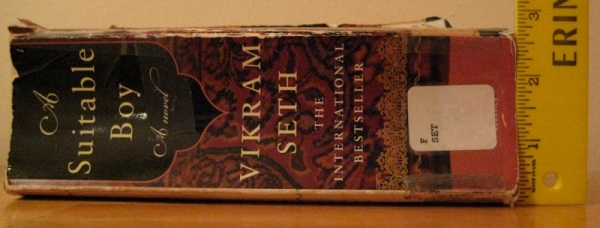
I’m actually looking forward to tackling this tome. I think having my sister to hold me accountable will keep me going. Though, I’m thinking I may have to buy my own copy, just in case the library wants theirs back, you know, sometime this year.
Here’s what the back of the book says:
“Vikram Seth’s novel is, at its core, a love story: Lata and her mother, Mrs. Rupa Mehra, are both trying to find–through love or through exacting maternal appraisal–a suitable boy for Lata to marry. Set in the early 1950s, in an India newly independent and struggling through a time of crisis, A Suitable Boy takes us into the richly imagined world of four large extended families and spins a compulsively readable tale of their lives and loves. A sweeping panoramic portrait of a complex, multiethnic society in flux, A Suitable Boy remains the story of ordinary people caught up in a web of love and ambition, humor and sadness, prejudice and reconciliation, the most delicate social etiquette and the most appalling violence.”
Has anyone read A Suitable Boy? Is it worth the fear it inspires? What’s the longest book you’ve ever tackled?
The Secret Project
When not (a) working up the nerve to tackle the behemoth pictured above or (b) frantically trying to finish the books I’m supposed to have done by the end of the month, I have been hard at work on an exciting secret project. It’s not quite ready, so I won’t be sharing it today. But! Do check back tomorrow, when the secret project shall be unveiled!
Happy Sunday, everyone!
My Week in Books: October 17-23
Welcome to a new Saturday feature here at Erin Reads that I’m calling:

My plan is to highlight what new books have entered my life, what I’ve been reading, and what’s happened on Erin Reads over the past week. Please let me know if you like (or hate) this new format!
New Acquisitions
I’ve had some books arrive this week about which I am extremely excited. Two showed up in the mail, and one came in at the library.
The Distant Hours by Kate Morton
This new novel from Kate Morton, out on November 9th, arrived in the mail yesterday. I’ve not yet read anything by Kate Morton, but her books have been recommended to me over and over again. Here’s what GoodReads has to say:
“A long lost letter arrives in the post and Edie Burchill finds herself on a journey to Milderhurst Castle, a great but moldering old house, where the Blythe spinsters live and where her mother was billeted 50 years before as a 13 year old child during WW II. The elder Blythe sisters are twins and have spent most of their lives looking after the third and youngest sister, Juniper, who hasn’t been the same since her fiance jilted her in 1941.
“Inside the decaying castle, Edie begins to unravel her mother’s past. But there are other secrets hidden in the stones of Milderhurst, and Edie is about to learn more than she expected. The truth of what happened in ‘the distant hours’ of the past has been waiting a long time for someone to find it.”
American Rose by Karen Abbott
By the author of Sin in the Second City, this one is a biography of Gypsy Rose Lee, who inspired the musical “Gypsy.” Somehow I missed that she was an actual person, so I am thrilled to read more about her! The book will be published at the end of December. From the back of the book:
“America in the Roaring Twenties. Vaudeville was king. Talking pictures were only a distant flicker. Speakeasies beckoned beyond dimly lit doorways; money flowed fast and free. But then, almost overnight, the Great Depression leveled everything. When the dust settled, Americans were primed for a star who could distract them from grim reality and excite them in new, unexpected ways. Enter Gypsy Rose Lee, a strutting, bawdy, erudite stripper who possessed a preternatural gift for delivering exactly what America needed.
“With her superb narrative skills and eye for compelling detail, Karen Abbott brings to vivid life an era of ambition, glamour, struggle, and survival. Using exclusive interviews and never-before-published material, she vividly delves into Gypsy’s world, including her intensely dramatic triangle relationship with her sister, actress June Havoc, and their formidable mother, Rose. Jazz- and Depression-era heavyweights make appearances as well, from Lucky Luciano and Harry Houdini to FDR, Fanny Brice, and the Minsky brothers–scrappy, savvy showmen who forever changed the face of American entertainment. Karen Abbott weaves their story into her rich narrative of a woman who defied all odds to become a legend–and whose sensational tale of tragedy and triumph embodies the American Dream.”
Will Grayson, Will Grayson by John Green and David Levithan
I’ve known about this book for a while, but it was Jodi’s review over on Minnesota Reads that prompted me to request it from the library. I’m hoping it will be a relatively quick read that I can squeeze in over the next few weeks! From the jacket flap:
“It’s not that far from Evanston to Naperville, but Chicago suburbanites Will Grayson and Will Grayson might as well live on different planets. When fate delivers them both to the same surprising crossroads, the Will Graysons find their lives overlapping and hurting in new and unexpected directions. With a push from friends new and old–including the massive, and massively fabulous, Tiny Cooper, offensive linesman and musical theater auteur extraordinaire–Will and Will begin building toward respective romantic turns-of-heart and the epic production of history’s most awesome high school musical.”
Read This Week
I spent this week frantically reading my first-ever challenge book as well as the book for my first-ever (voluntary) readalong, both of which are supposed to be done by the end of the month:
- Yesterday I finally finished The Portrait of Dorian Gray by Oscar Wilde for the Dueling Monsters readalong. I liked it quite a bit, except for chapter 12, which took me forever to get through! Once I finish listening to The Strange Case of Dr. Jekyll and Mr. Hyde I’ll be posting thoughts on both.
- I’ve just started A Thousand Splendid Suns by Khaled Hosseini for the World Party Reading Challenge. This month’s country is Afghanistan. I was unimpresed with The Kite Runner, but many people have told me they liked A Thousand Splendid Suns better.
On audio, I’ve just about finished up David Sedaris’s When You Are Engulfed in Flames. I’ve read Sedaris’s books before, but listening to him read them is a completely different experience!
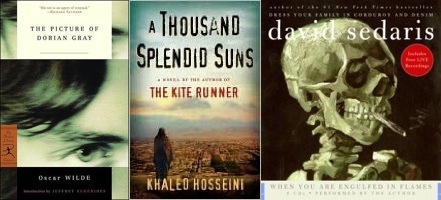
Erin Reads Recap
- I started the week with a Sunday Salon post in which I asked how different readers cope with awful books. There were lots of interesting replies as people chose sides: completionist or abandonist?
- On Monday I shared an overdue review of The Catcher in the Rye by J.D. Salinger, which I read for Banned Book Week but couldn’t quite figure out how to write.
- Next up was my long-awaited look Daniel Pennac’s splendid little volume, The Rights of the Reader. It’s one I think just about every reader will thoroughly enjoy perusing!
- Wednesday’s post was a plea for help from world literature lovers; I needed suggestions for my World Reading Challenge books for the year. I was thrilled that so many people offered recommendations. If you have any to add, I’d be quite glad to hear them!
- I reviewed The Girl Next Door by Selene Castrovilla on Thursday. It’s a young adult novel about two friends, one of whom has terminal cancer. Just one minor quibble, and the rest I quite liked.
- Finally, yesterday, I began a Friday miniseries discussing audiobooks. I quite love them and, over the next few weeks, will be highlighting some of my favorites in different genres.
Your Turn!
How was your reading week? Do tell!
Books For Your Ears (and My Love For Them)
I’ve listened to 25 audiobooks so far this year. I just checked. Frankly, I’m a bit blown away by that number.
What prompted me to look at my list was a post by Melanie at Reclusive Bibliophile, who just finished her first audiobook and is looking for suggestions for what to pick up next. As I scanned my LibraryThing collections for recommendations I could pass along, I found myself thinking about the first audiobook I finished and the impact it had on me.
I only started listening to audiobooks in 2009. Before then, I didn’t really “get” them. I’d heard bits and pieces of various productions, all of which I hated. They came across as phony, overdramatic, and sometimes even painful to listen to. I didn’t understand that, just as there are good writers and not-so-good writers, there good audiobook readers and their not-so-good counterparts.
At Book Expo America in 2009, I had the pleasure of meeting Barbara Rosenblat and Cassandra Morris, the readers for Muriel Barbery’s bestselling novel The Elegance of the Hedgehog. I picked up a signed copy of the audiobook, figuring I could always give it away if I hated it.
But oh. I did not hate it. I loved it.
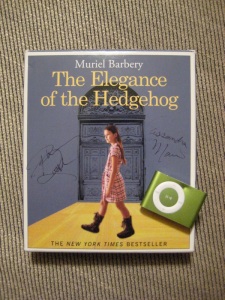
I listened to The Elegance of the Hedgehog almost nonstop one weekend, driving a total of 6 hours to and from Boston to visit a friend. I was enthralled. I could not wait to get back in my car and start driving again. The way the readers breathed life into their respective characters was unlike anything I’d ever heard. I was hooked.
After finishing The Elegance of the Hedgehog, I began seeking out other well-done audiobooks. Initially I always borrowed them from the library, as my early experiences with audiobooks had taught me to try each one before committing. Now that Audible.com offers free online samples, feeding my semi-addiction has gotten much easier. I always have an audiobook loaded up on my iPod shuffle. When I cook, clean, knit, walk, even drive, I’m always listening to an audiobook. (Though, um, not with headphones while driving.)
Personally, I’ve found I prefer audiobooks told by rather than about the characters. Pair a first-person narrative with an outstanding reader and it’s like having someone telling you her story. I’ve tried fancy productions like the Harry Potter audiobooks, but they’ve never done anything for me. I prefer the intimacy of having one or two characters talk to me. Any memoir or first-person fiction is fair game.
Over the next few Fridays, I’ll be featuring some of my favorite audiobooks by group: fiction, classics, nonfiction, and young adult. These are all productions I’d recommend to anyone, whether you are new to audiobooks or have been listening much longer than I have.
Of course, I’ll be asking for your recommendations on future posts. But for now, I’m curious: Do you listen to audiobooks? If so, are there certain genres or styles you prefer as audiobooks over others? If not, are you interested in trying them?
Review: “The Girl Next Door” by Selene Castrovilla
I won a copy of The Girl Next Door by Selene Castrovilla during Book Blogger Appreciation Week last month. It arrived in the mail last week, and I started reading right away.
About the Book:
“While most seniors at her high school are worrying about prom and final exams, seventeen-year-old Sam is desperately trying to save her best friend Jesse’s life. He has a rare, treatment-resistant form of cancer, and his odds of survival aren’t good–he may have only ten months to live. Through every bit of his pain and anguish, Sam has been by his side–through the grueling, aggressive treatments and their awful aftermath, to sleeping in his room at night when he’s afraid to be alone. Best friends and neighbors since preschool, Jesse and Sam’s friendship is changing–now they’re falling in love, and the bond between them grows stronger even as Jesse weakens. Will they have a happy ending…or will their story end in heartbreak?”
(From the jacket flap)
My Thoughts:
As a young teen, I devoured Lurlene McDaniel’s tales of heartbreak, a phase which I have most definitely outgrown. So, when I read McDaniel’s endorsement on the cover of The Girl Next Door, I worried it would be either cheesy or overwhelmingly heartbreaking. I was pleasantly surprised to find that neither was true.
Sam, the novel’s narrator, was warm and strong and real. I liked her from the beginning. The other characters, though less dynamic than Sam, were also believable, if a touch cliched. The writing was good about 95% of the time, with just a few spots that made me cringe a little. Hey, it happens.
The story is as much Sam’s as Jesse’s. Yes, Jesse is the sick one, and time is given to his feelings. But I would say that more emphasis is placed on Sam and her struggle to deal with Jesse’s illness. I am thankful never to have been in a situation like Sam’s, so I’m not in a place to judge accuracy, but her reactions and thoughts felt very genuine to me. I found myself rooting for her to work through her issues just as much as I was rooting for Jesse to get well.
The one thing that bothered me, that kept jarring me away from the narrative, could be considered spoiler. If you are particularly spoiler-sensitive, please skip the next paragraph!
**POTENTIAL SPOILERS**Early on in the book–like, page 45 out of 237–Sam addresses the problem that Jesse doesn’t want to die a virgin. How does she address it? By climbing into bed with him herself. Which is fine. Except that AFTER they start sleeping together is when they admit they have “fallen in love.” Why couldn’t it have been before? It would’ve made their love seem more realistic, I think. The constant references to sex just seemed…unnecessary. I would be immersed in Sam and Jesse’s relationship, in the issues they were each struggling with, and then all of a sudden Sam would casually mention how much they’d been making love. I can see where they’d want to do it–a lot–but the mentions kept pulling me out of the story. A relatively minor quibble with a generally good book.**END OF POTENTIAL SPOILERS**
If you enjoy books along these lines, I think The Girl Next Door would be a great choice. If books like these make your toes curl and provoke involuntary shudders, best to stay away. I fall somewhere in between, and my reaction was correspondingly neutral: I didn’t love the book, but I didn’t hate it either. I think illness can be a tough topic to tackle in a novel, and I certainly wasn’t disappointed with Castrovilla’s execution.
Your Turn!
How do you feel about books that deal with illness? Are there any particularly good ones you’ve read? Do you find them difficult to read?
Readers of the World, I Need Your Help!
Okay, readers, I need your help.
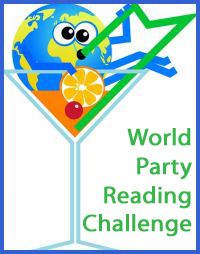
I’ve joined the World Party Reading Challenge, hosted by Packabook, who took over from Fizzy Thoughts. I’m really excited to read more world literature! But first…I have to find it.
The challenge site offers suggestions for each month, which is a wonderful resource. Or, I could always turn to trusty old Google. But I really like having people who know and love a book tell me, “Hey, this one would be perfect!”
The challenge is to read one book each month from the assigned country. Books can be fiction or non-, print or audio. I’d especially love to read books not only set in the specified country (as the challenge requires), but also by an author from that country. Here is the list of countries by month:
- October 2010: Afghanistan – I’ve got this one covered with A Thousand Splendid Suns by Khaled Hosseini
- November 2010: Turkey
- December 2010: Greece
- January 2011: Iran – I’m thinking Reading Lolita in Tehran by Azar Nafisi, unless someone has (a) reasons why I shouldn’t, or (b) other, awesomer recommendations
- February 2011: England
- March 2011: Ireland
- April 2011: Jamaica
- May 2011: Pakistan
- June 2011: Russia
- July 2011: Spain
- August 2011: Thailand
- September 2011: India – I have some ideas, but would love suggestions too!
Do you have a favorite book set in (and possibly by an author from) any of these countries? Or maybe one you’ve heard great things about and are dying to read? I would love to know about it! Feel free to gush in the comments, or even leave a link to your review, if you’ve written one. Thank you!
Review: “The Rights of the Reader” by Daniel Pennac
I have been putting off writing my review of Daniel Pennac’s The Rights of the Reader. Quite honestly, the tasks of weeding through all the amazing quotes I wanted to share and shrinking all my comments down into a manageable review were rather daunting. Really, I would recommend that anyone even remotely interested in the book head out to the local bookstore or library and just get a copy. At only 165 highly illustrated pages, The Rights of the Reader takes no time to get through but will leave you with plenty to ponder.
The Rights of the Reader was originally written in French and published in 1992. The edition I read, published by Candlewick Press in 2008, was translated by Sarah Adams and illustrated and introduced by the fabulous Quentin Blake (who illustrated all of Roald Dahl’s books). Pennac, now a writer, used to teach, which explains why much of The Rights of the Reader focuses on the pedagogy of reading (as it is approached in France) and the relationship between young people and books.
The book is divided into four parts, which build on each other:
Part 1: Birth of the Alchemist
In the opening section of The Rights of the Reader, Pennac contrasts the teenage reluctant reader and with the young child eagerly awaiting her bedtime story. How does a child go from being entranced by books to struggling with them? From finding magic in the first word written word he learns to dreading the English composition due Friday? How does reading go from a joy–a reward, even–to a chore, a form of punishment?
There is, of course, television. There are generational differences. But Pennac places a heavy responsibility on the parents:
If young people don’t like reading, let’s not blame television or the modern world or school. Or rather, blame them all, but only after asking what we have done to that ideal reader since the days when we played at being both storyteller and book.
With the onset of school, Mom and Dad start thinking like teachers instead of reading to a child with no strings attached. They expect their child to explain what he’s read, asking questions to make sure he’s understood. Instead of being allowed to experience the language and emotions, children are required to interpret each story. With these changing expectations comes a change in the child’s attitude toward reading. And to Pennac, parents play a role in this shift.
The key, says Pennac, to preventing this crippling transformation is reading aloud. Even when a child has begun learning to read, her parents must continue to bring stories alive for her.
Part 2: Reading Matters (The Dogma)
In the second section, Pennac turns his attention to how the French school system teaches books. He comments:
Schools everywhere have always confined themselves to making students learn techniques and write essays, while proscribing treading for pleasure. It seems to be established in perpetuity, in every part of the world, that enjoyment has no part to play in the curriculum, and that knowledge can only be the fruit of suffering.
There is, of course, the occasional teacher who manages to impart her enthusiasm for her subject to her students, but this sort of educator is rare. Kids who liked reading before they got to school will continue to read, regardless of their classes. The ones who didn’t probably won’t become readers through school; they’ll just learn to “talk around the book” in order to pass their literature classes.
Pennac’s argument is by all means, teach the curriculum, but teach it with enthusiasm. Help the students learn to love reading by sharing your enthusiasm for and enjoyment of books. And–yes–read aloud.
Part 3: The Gift of Reading
For this third part of The Rights of the Reader, Pennac sets up a fictional class:
Failures is the word. Washed up, while their friends are safely on board high school steamers heading for “big careers.” This is the human wreckage left behind by the academic tide.
Lucky students. They’ve ended up with a teacher who will read to them. He pulls out a massive tome and begins to read, despite the students’ protests that they are too old, or not interested. They need not take notes, he assures them; they need only listen. And so they do. As he reads, time flies. The students discover that books do not, in fact, require mountains of time to get through; nor are they necessarily dull. By reading aloud and simply asking the students to listen, the teacher undoes all his pupils’ preconceived notions of what it means to read.
Pennac insists that, once the interest in books has been rekindled, learning and reading will follow naturally. Heck, the curriculum might even get covered without anyone noticing. Pennac writes:
The question of what [the students have] understood (the final question) isn’t without interest. Have they understood the text? Yes, yes, of course. But what they’ve understood above all is that once you’ve come to terms with the idea of reading, and the text is no longer a paralyzing enigma, then the struggle to find its meaning becomes a pleasure. The fear of not understanding overcome, effort and pleasure work powerfully in tandem. The more I try, the more I enjoy; and the more I enjoy, the more I want to try.
Part 4: The Rights of the Reader
In this section, Pennac lists ten Rights of the Reader and offers a brief discussion of each. It was my favorite part of the book, the piece to which I could best relate and the easiest lesson to take away with me. To keep this post from developing into a book itself, I’ll just refer you to my earlier post about The Rights of the Reader, in which I list and discuss each of the ten rights.
My Thoughts
I really enjoyed Pennac’s The Rights of the Reader. Though I am neither a parent nor an educator, the points he makes resonate with my own experience. When my siblings and I were children, my mother spent long hours reading to us from all kinds of books. We would bring our pillows and blankets into one sibling’s room according to a rotating schedule. Then we would all curl up together to listen to the story. These daily reading sessions are among my fondest memories, and I have no doubt they helped shape me into the reader I am today.
In high school, though, the constant analysis of classics led me to avoid them. Until very recently, I don’t think I’d ever picked up a classic outside of a classroom setting. To me, classics were boring and hard and inaccessible without the application of extended effort.
Not long ago, I decided to listen to To Kill a Mockingbird as an audiobook, and you know what? I loved it. I’ve listened to several classics since then and enjoyed every one. It helps me immensely to have the stories brought alive through the reader’s voice. I’ve found I will pick classics up more readily and enjoy them more easily in written form now that I’ve gotten over my classics angst.
I’d spent years suspecting classics existed just to torture poor students. When I read this line in third section of The Rights of the Reader, I felt like it had been written for me:
What we need to understand is that books weren’t written so that young people could write essays about them, but so that they could read them if they really wanted to.
Is every parent going to devote hours to reading to his child? Probably not. Will every teacher, upon reading The Rights of the Reader suddenly begin to infuse her teaching with enthusiasm and spend every class reading Joyce and Salinger to her students? I doubt it. But this slim little volume has wonderful things to say about books and reading to anyone who will listen, be they teacher, parent, student, or book lover.
Bonus: A Wordle!
One of the minichallenges, hosted by Carina at Reading Through Life, during last Saturday’s Readathon was to create a Wordle based on a post you liked. I used Pennac’s ten Rights of the Reader from my earlier post about them. Here’s my Wordle:
Your Turn!
How do you feel about Pennac’s observations? Do you have any examples (or counterexamples) from your own experience?
Review: “The Catcher in the Rye” by J.D. Salinger
I read The Catcher in the Rye by J.D. Salinger for Banned Books Week in September. It took me some time to figure out what I wanted to say about the novel, so my review is a bit delayed. Better late than never, I suppose!
About the Book:
Holden Caulfield has been kicked out of multiple well-known boys’ schools. In fact, he begins his story just after he’s been expelled from Pencey, his latest, and is waiting out the final days of the term before Christmas holidays, when he will leave Pencey for good and return to New York City. One night, a few days before winter break begins, Holden decides he’s too “sad and lonesome” to wait the term out at Pencey. He packs his bags, gets on a train to New York, and spends the next few days killing time in the city, wandering from hotel to bar to museum, calling anyone he can think of, and avoiding his parents.
The novel really only spans those few days, from just before Holden leaves Pencey to just before he sees his parents. It’s bookended by just enough mentions of “this crumby place” to make you suspect he’s not narrating from home or school. These brief paragraphs are all we really get of Holden’s future beyond the story he tells.
My Thoughts:
How, exactly, does one review J.D. Salinger’s The Catcher in the Rye? Perhaps I’ve been brainwashed by four years of high school, but I feel a composition exploring themes and unraveling characters would be more appropriate than a blog post. The difference between high school and now, though, is that I thoroughly enjoyed the reading and wouldn’t mind writing that paper!
I never read The Catcher in the Rye in high school. It was an option, but I chose to read Their Eyes Were Watching God by Zora Neale Hurston instead. As I opened the copy of Salinger I’d gotten from the library for Banned Books Week, it occurred to me that I had no idea what the book was about. After reading the novel, I feel my question was misguided. It’s not what the book is about that’s important–it’s who.
Holden’s voice is what made The Catcher in the Rye for me. It’s rambling and unfiltered and exaggerated, teeming with verbal idiosyncracies and reeking of Holden’s personality. If you haven’t yet met Holden, here is a taste:
Anyway, I put on my new hat and sat down and started reading that book Out of Africa. I’d read it already, but I wanted to read certain parts over again. I’d only read about three pages, though, when I heard somebody coming through the shower curtains. Even without looking up, I knew right away who it was. It was Robert Ackley, this guy that roomed right next to me. There was a shower right between every two rooms in our wing, and about eighty-five times a day old Ackley barged in on me. He was probably the only guy in the whole dorm, besides me, that wasn’t down at the game. He hardly ever went anywhere. He was a very peculiar guy. He was a senior, and he’d been at Pencey the whole four years and all, but nobody ever called him anything except “Ackley.” Not even Herb Gale, his own roommate, ever called him “Bob” or even “Ack.” If he ever gets married, his own wife’ll probably call him “Ackley.” He was one of these very, very tall, round-shouldered guys–he was about six four–with lousy teeth. The whole time he roomed next to me, I never even once saw him brush his teeth. They always looked mossy and awful, and he damn near made you sick if you saw him in the dining room with his mouth full of mashed potatoes and peas or something. Besides that, he had a lot of pimples. Not just on his forehead or his chin, like most guys, but all over his whole face. And not only that, he had a terrible personality. He was also sort of a nasty guy. I wasn’t too crazy about him, to tell you the truth.
Long-winded? Meandering? Yes. That’s Holden.
Crazy as he might have been, I really liked Holden. The poor guy is disillusioned with pretty much everything in his young world, so his attitude is as sour as they come. He acts badass, but he’s just a nice guy underneath. Despite all the swearing (seriously, the most foul-mouthed of sailors would be proud), I can see why this book is often a favorite of high school English students. Holden is relatable in a way many other classics characters are not.
I’ll leave you with one of my favorite Holden quotes:
What really knocks me out is a book that, when you’re all done reading it, you wish the author that wrote it was a terrific friend of yours and you could call him up on the phone whenever you felt like it.
Your Turn!
Have you read The Catcher in the Rye? If so, how old were you when you did? If not, do you have any interest in it? And of course…what author do you wish was a “terrific friend of yours” so you could call him or her whenever you liked?
The Sunday Salon: How Do You Cope?
A few days ago, Clare from The Literary Omnivore and I had the following conversation on Twitter about a particularly bad book she was reading:
ErinReadsblog: Do you abandon awful books or just plow through? I find they often slow my overall reading down because I’m busy avoiding them.
litomnivore: I plow. I’m a completionist. Although, this one is a bad thriller, so I can narrate passages in my Batman voice and giggle.
Aside from providing a fantastic (and unexpected) mental image, this brief discussion made me think. I’ve considered which side of the fence I’m on regarding “awful books,” but Clare’s comment made me realize I’ve never gone any deeper than just picking a side. I’ve definitely never thought about how to make reading an “awful book” more fun (Batman voice, anyone?). So today, I’m taking a look at how I cope with the dreaded “awful books,” and why.
A definition, to kick things off:
Cope (verb)
1. to struggle or deal, esp. on fairly even terms or with some degree of success (from Dictionary.com)
I like this definition because it puts me on equal footing with my book, so that we become two entities sort of sizing one another up. Like two people, my book and I may not see eye to eye. In such situations, I have to figure out how to deal with this lack of alignment. (Lucky book…its inanimate-ness exempts it from such strategizing!)
Whereas Clare is a self-proclaimed “completionist,” I am firmly in the “life is too short to read bad books” camp. Which would make me…an abandonist? Or at least, I am when it comes to reading for pleasure. Of course, different reader-book relationships require different coping strategies. I find I have three:
Coping Strategy 1: Abandon the “Awful Book”
If I chose the book to read for pleasure, I give it about 50 pages. If, by then, I’m not feeling it, I give myself permission to set it aside. Otherwise, I’ll just feel guilty about not reading it, and it will weigh me (and my reading) down like a big, papery albatross.
It sometimes takes me a few days to realize I’m not crazy about a book. If, one day, I realize I haven’t read much lately, one of my books is usually to blame. I feel obligated to read the “awful book,” but I don’t want to, so I just allow my reading in general to taper off. So, my rule is: if I’m not trying to find time to spend with a particular book, it probably just isn’t for me. I can get rid of it altogether or just save it for later, but it gets removed from my current reading rotation.
Along these same lines, Gretchen Rubin, author of The Happiness Project, recently posted an article about reading and happiness. In it, she advocates reading something you actually want to read instead of something you feel like you should read. She quotes Samuel Johnson: “What we read with inclination makes a much stronger impression. If we read without inclination, half the mind is employed in fixing the attention; so there is but one half to be employed on what we read.” I do find that’s true for me, and I often feel like I’m squandering time and brain power when I struggle with a book that doesn’t really appeal.
Coping Strategy 2: Read the “Awful Book” as Quickly as Possible
If I’m reading a book I’ve agreed to review, I force myself to read it in order to fulfill my commitment. I might skim, but I’m not a big fan of DNF (did not finish) reviews, so I do try to get through the whole thing. I let myself scribble snarky, sarcastic notes about the book as I’m reading, which I then tone down for the actual review.
I often choose to focus solely on the book in question until it’s finished. My reasons for doing so are twofold: first, I get it over with as soon as possible, and second, isolating the “awful book” prevents me from comparing it with whatever other (hopefully better) book I’m reading.
Coping Strategy 3: Read the “Awful Book” in Small, Spaced Out Chunks
If an “awful book” is for a book group, class, or other meeting, I try to space out my reading so that I take lots of little bites instead of one big, slimy gulp. By breaking it up into chunks, I only have to read a little at a time. It becomes like a daily chore, unpleasant but necessary.
After I wrote strategies #2 and #3, I realized that they are a drastically different approach to the same kind of book: one I have to read but just don’t enjoy. Why not just read the “awful book” for book group super fast and be done with it? I suspect it has something to do with having to remember the information. Whereas an “awful book” can be quickly read, reviewed, and forgotten, it must be remembered for longer if it is to be discussed with other people. Breaking up the text helps the book stick. In addition, an assigned book has a deadline by which it must be read. While a book for review may have an approximate goal for completion, the deadline is usually both more flexible and up to me to reinforce. I could put it off indefinitely! Better to just read it and be done.
So there you have it…my in-depth look at how I cope with “awful books.”
What about you?
Are you a completionist, an abandonist, or both? Always, or just in certain situations? Why do you think you cope with “awful books” the way you do? And of course, do you–like Clare–have any creative coping techniques? I’d love to hear from you!

